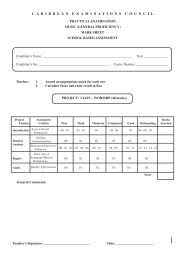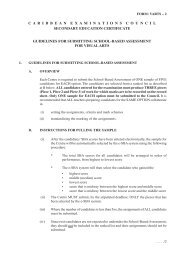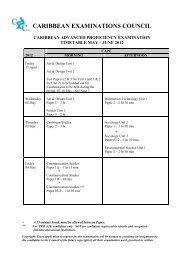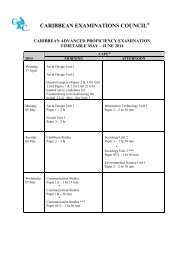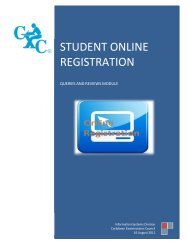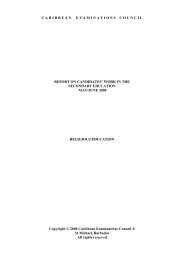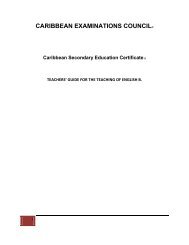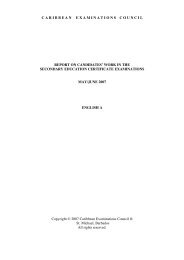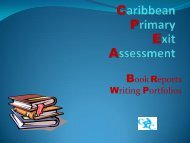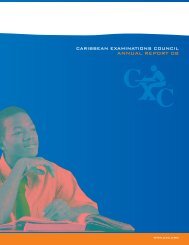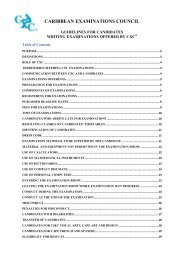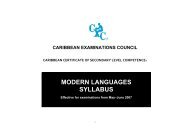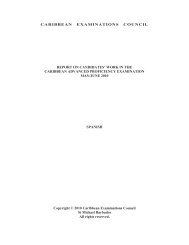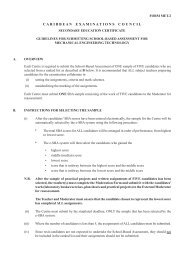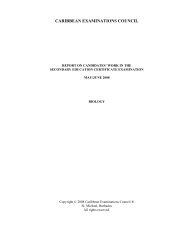The <strong>Caribbean</strong> <strong>Examiner</strong>RECOGNITION OF <strong>CXC</strong> QUALIFICATIONSAESon CSECand CAPEAcademic Evaluation Services (AES) is basedin Florida and consequently has a large number ofapplicants from the <strong>Caribbean</strong> region. Thus, AEShas made it a special priority to keep abreast of thelatest developments in <strong>Caribbean</strong> education. Ourshared language and historical background and thecommonalities between the US educational systemand that of the <strong>Caribbean</strong> can make it difficult for a USadmissions counselor to decipher credentials submittedby applicants from the <strong>Caribbean</strong>. The superficialsimilarities between the two systems – from high schooldiplomas to bachelor degrees, from the use of the A-Fgrading scale on many transcripts to the increasinglycommon US-style associate degrees – mask somesignificant differences, the most prominent of whichare the examinations and credentials offered by the<strong>Caribbean</strong> <strong>Examinations</strong> <strong>Council</strong> (<strong>CXC</strong>).Our philosophy in evaluation is to hold studentsto the standards expected of them in the educationsystem in which they study. Therefore, the primarycredential that we look for when determiningthe equivalency of US high school graduation isthe <strong>Caribbean</strong> <strong>Examinations</strong> <strong>Council</strong>’s SecondaryEducation Certificate (CSEC), rather than diplomasfrom the high schools attended. We explain on ourevaluation reports that high school diplomas, whilevaluable for entry to the workplace, are not sufficient foruniversity admission in the <strong>Caribbean</strong> region, and thatsitting for the CSEC – and passing the examinationsat a certain standard – are required for universityadmission.AES goes into great detail on our evaluationreports when the CSEC is submitted. We list eachindividual examination, whether it was passed atthe General, Basic or Technical proficiency level, thegrade received and whether the grade was considered“with credit” (Grades I, II and III) or “without credit”(grades below III). We also specify whether or not theexaminations for English A and Mathematics werepassed with credit, that is Grades I-III, as these gradesare normally required for university admission in the<strong>Caribbean</strong>. While such details can be time-consuming,we have found that the recipients of our evaluationreports appreciate knowing how we arrive at ourfindings and respect our methodology.Increasingly, students from the <strong>Caribbean</strong> regionare sitting for the <strong>Caribbean</strong> Advanced Proficiency<strong>Examinations</strong> (CAPE) after successful completionof the CSEC. At AES we encourage holders of theCAPE to order a course-by-course analysis to receivepotential undergraduate transfer credit for theseexaminations. We recommend up to five semesterhours of undergraduate credit for each Unit successfullyachieved on the CAPE, that is, Grades I-V. As with theCSEC, we discuss the CAPE in detail on our evaluationreports to explain our methodology and rationale. Wehave found that the undergraduate transfer credit werecommend for the CAPE is usually honoured by therecipients of our evaluation reports.AES seeks to obtain the most accurate and up-todateinformation available for our credential evaluationresources and for <strong>Caribbean</strong> students; we have nobetter partner than the <strong>CXC</strong>. We appreciate the <strong>CXC</strong>’spresence at international conferences such as NAFSAand make sure our evaluators attend their informativesessions where the latest trends, updates and changes in<strong>Caribbean</strong> education are discussed. We have also foundthe staff of the <strong>CXC</strong> to be extremely helpful wheneverwe have need to contact them with general questionsor questions about specific examinations. With thegrowing number of <strong>Caribbean</strong> students taking theCSEC and CAPE, and with the increasing numbersof <strong>Caribbean</strong> students pursuing further education inthe US, AES is looking forward to a long and fruitfulpartnership with the <strong>CXC</strong>.Academic Evaluation Services (AES) is Floridabasedagency which provides US educationalequivalencies and translations services.32 MAY <strong>2012</strong> www.cxc.org
The <strong>Caribbean</strong> <strong>Examiner</strong>What instituions say about CSEC and CAPE<strong>CXC</strong> Qualificationsget Recognition in IndiaThe Association of Indian Universities(AIU), the organisation which is the clearinghouse for international qualifications in India hasgranted equivalence to the <strong>Caribbean</strong> SecondaryEducation Certificate (CSEC) and the <strong>Caribbean</strong>Advanced Proficiency Examination (CAPE), thetwo leading qualifications offered by <strong>CXC</strong>.In a letter to <strong>CXC</strong>, the Indian HighCommissioner in Trinidad and Tobago conveyedthe news to Dr Didacus Jules, <strong>CXC</strong> Registrar.The AIU has granted equivalence to<strong>Caribbean</strong> Secondary Education Certificate(CSEC) with a minimum of five subjects atGrades I and II with Grade 10 examination ofan Indian [examinations] board.With respect to CAPE, the AIU hasaccorded equivalence to CAPE with a minimumof five subjects, with a plus-two stage qualificationof an Indian [examinations] board; this theAIU states, is also the minimum eligibilityrequirement for admission to a bachelor degreeThe NCAA Eligibility Center utilisesCSEC and CAPE qualifications as proof ofupper secondary school graduation. TheNCAA has established guidelines for thelowest passing grade (see NCAA Guide toInternational Academic Standards for AthleticsEligibility). This document can be viewed atwww.ncaapublications.com.Please note the examinations must be takenin the appropriate time frame for the student’scountry. The results of the examinations areused to calculate the grade point average used todetermine NCAA Division I and II grade pointaverage requirements.It is important to note that the NCAAexpects students to present five or more subjectpasses at the general level with at least oneexamination in each of the NCAA core subjectareas (English, mathematics, science, socialscience and a fifth examination in either foreignlanguage, Religious Education, or an additionalexamination from English, mathematics, scienceor social science). Repeated examinations do notcount as an additional exam.We encourage students to take a minimumof two CAPE subjects which may be used tomeet a required core subject examination. Inaddition, the CAPE subjects have an importantrole in determining the NCAA expectedgraduation date.programme at an Indian university.The statement points out that thosecandidates who are successful at CAPEare eligible to join conventional degreeprogrammes at Indian universities; however,candidates who wish to pursue a professionaldegree programme are required to have studiedBiology, Chemistry, English, Mathematics andPhysics at the advance proficiency level.“This is good news for <strong>CXC</strong> and the<strong>Caribbean</strong>,” stated Dr Didacus Jules, Registrarof <strong>CXC</strong>. “It is another statement that assuresus in the region that the qualifications offeredby <strong>CXC</strong> are of a very high standard and standup to international scrutiny.”Dr Jules added that it now meansthat <strong>Caribbean</strong> students wishing to study atuniversities in India can pursue their studieswithout much of the red tape they encounteredin the past.NCAA on CSECand CAPE By Mike Donahue, PhDThe following CSEC and CAPEsubjects meet core subject areas:English: Communication Studies,English A, English B, and Literatures inEnglish.Mathematics: AdditionalMathematics, Mathematics, and PureMathematics.Science: Biology, Chemistry,Environmental Science, Human andSocial Biology, Integrated Science, andPhysics.Social Science: <strong>Caribbean</strong> History,<strong>Caribbean</strong> Studies, Economics,Geography, History, Law, Social Studies,and Sociology.Additional: French (CAPE or CSEC)Spanish (CAPE or CSEC) and ReligiousEducation.Dr Mike Donahue is the Assistant Directorof International Academic Certification atthe NCAA Eligibility Center in Indiana,USA.The University Of Waterloo, Ontario, Canadahas been in Barbados for almost every fair. Directorof Undergraduate Recruitment, Andre Jardin, said<strong>Caribbean</strong> Advanced Proficiency Examination(CAPE) was one of the “strongest systems you coulddo anywhere – it’s actually stronger than our ownCanadian curriculum”.The Nation Newspaper, 8th November 2011“We feel that students who have achievedstrong results in their CAPE Units 1 and 2examinations are well prepared for entry to McGillUniversity, for advanced standing credits andexemptions towards our degree programmes andfor successful studies with us.”Katherine <strong>May</strong>hew,Senior Admissions Officer, McGill University“For each CAPE course, the equivalent of sixcredit hours at Saint Mary’s University is granted”.Dr Paul Dixon, St Mary’s University“We will be pleased to commend CAPEas a higher education entry qualification to UKhigher education institutions and to present itsfull flexibility. Our objective would be to ensurethat CAPE is well understood by the full rangeof admissions tutors so that students with CAPEqualifications will maximise their personal benefitsfrom UK higher education.”UK National Academic RecognitionInformation Centre (NARIC), July 1999“If you are taking CAPE Unit 2 level examsand score Grades I and II on any of the followingsubjects, and you are admitted to AU and joinour global community, you will receive advancedstanding AND credits for UA level classes....We atAU value CAPE and the education that you havereceived at home...”Evelyn Levinson, Director of InternationalAdmissions at American University“CSEC - We have found that these resultsaccurately reflect students’ academic abilitiesand preparation for post-secondary study. SUNYPlattsburgh has been awarding transfer creditfor successful completion of CAPE for severalyears. Students with satisfactory CAPE resultsenter with advanced standing which enablesthem to complete their bachelor’s degrees inthree (3) years. The content of the CAPEs appearsto be comparable in content and intensity tointroductory-level courses in various disciplineswithin our course offerings.”Mrs. Jacqueline “Jackie” Girard Vogl,Assistant Vice President,International Enrollment Management,SUNY Plattsburghwww.cxc.org MAY <strong>2012</strong> 33



